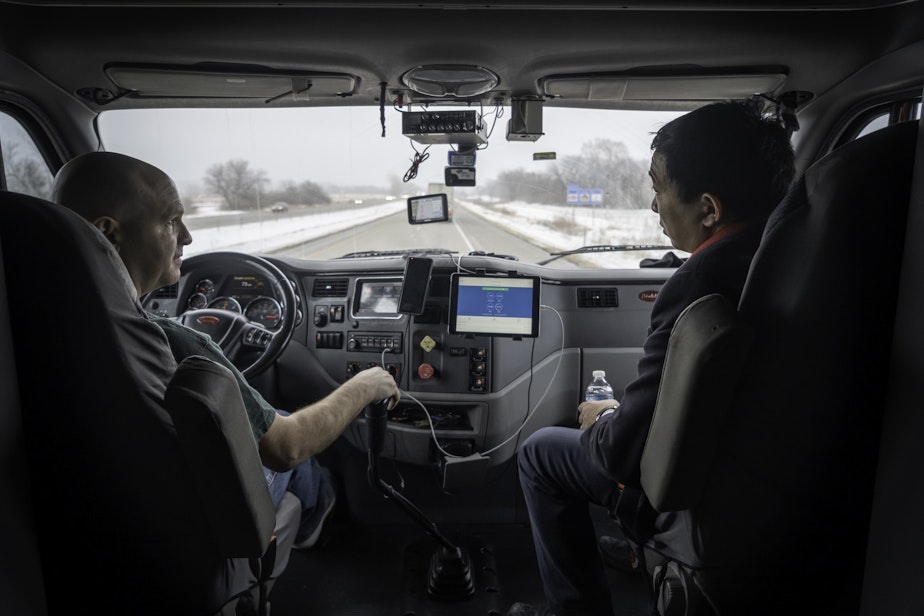Presidential candidate Andrew Yang calls for national 'Amazon tax'

Robots, in driverless cars and other forms, are expected to put millions of Americans out of work in the coming decades. What's the solution?
According to Democratic presidential candidate Andrew Yang: Just pay everyone a guaranteed income of $1,000 a month.
That's what he said on his recent campaign visit to Seattle. And Yang told KUOW reporter David Hyde he’d pay for it by tapping the wealth of big tech companies like Amazon.
The following interview was edited for style.
Hyde: Why do you see a guaranteed income as a key issue for beating President Trump in 2020?
Yang: The reason why Donald Trump is our president today is that we'd automated away 4 million manufacturing jobs in Michigan, Ohio, Pennsylvania and Wisconsin.
And now we're going to do the same thing to millions of retail jobs, call center jobs, fast food jobs, and truck driving jobs. It’s also happening in white-collar work like accounting and bookkeeping, and on and on through the economy.
Sponsored
So what’s your solution to automation leading to job losses?
The solution that other people focus on is education and retraining. But the tough truth is that only 8 percent of American jobs are in science, technology, engineering and mathematics (STEM) fields, and it's impractical to train many people who are going to be displaced.
So the best path forward is to distribute the economic value from all these incredible gains. The flagship proposal of my campaign is that every American adult receive $1,000 a month to do whatever you want, starting at age 18.
This would create over 2 million new jobs in the economy. It would give us a path forward. It would make families stronger and healthier. It would also enable many more Americans to both adjust and do the kind of work that we want to do.
Sponsored
I'm sure you're hearing people say: Wait a minute. Americans want to work. Is this giving up on the American dream?
It’s actually very pro-work. If we all had another $12,000 a year that money would go through the economy over and over again in our local hardware stores and tutoring services, and they would all have to hire more people.
It would also start to recognize the vital work that goes on in our homes and communities every day, particularly the work of mothers and parents and caregivers.
I’ve read this idea will cost trillions of dollars. Who pays for it?
The big change we have to make is to put all Americans in a position to gain from the technological advances and innovations in our economy.
Amazon is now half of all e-commerce in this country. It's soaking up another $20 billion in commerce every year.
That is pushing 30 percent of American malls and stores to close in the next four years, and working as a retail worker or cashier is the most common job in the economy.
Sponsored
And if you listen to the news you know that Amazon paid zero in federal taxes in 2018. So if you have a trillion-dollar tech company that pays zero in taxes, then you really are going to be struggling to pay for this dividend.
The single biggest change we have to make is to join every other advanced economy in the world and have a value-added tax (VAT).
That's basically a national sales tax and you're proposing at a 10 percent rate. How would it work?
A sliver of every Amazon sale and every Google search and every Facebook ad and every robot truck mile adds up to billions, tens of billions over time.
It also says on your website that you would tax luxury goods a a higher rate, and you would tax staples, like bread, at a lower rate.
But Seattle already has one of the most regressive tax systems in the country. We don't have an income tax. We've got a very high sales tax.
So what's the case for Seattleites who are already struggling to pay their bills to support a VAT, which is basically a national sales tax, on top of that?
For Seattleites who are struggling to pay your bills, what would you do with an extra $1,000 a month? That’s an extra $12,000 per individual, or if you have two adults in your household, that's $24,000 a year.
The great thing about this value-added tax is it's going to fall [mainly] on the people in Seattle like Jeff Bezos who can afford it. They're going to pay millions, perhaps billions, and then we'll be distributing those gains to the people in Seattle who will actually be able to spend that money in the economy.
Sponsored
You're making this proposal in Amazon’s backyard. What kind of a reaction are you getting from tech workers and entrepreneurs in the Seattle area?
I am friends with a lot of people who work in technology and a lot of people in those fields are supporting my campaign. They know their work is impacting other parts of the economy.
It’s ridiculous to hold technology companies responsible for all the downstream effects [that automation is having] on the economy.
It’s impossible for them to know about all those effects. It’s not their job. It’s our job, or the job of our government.
But our government is asleep at the switch. That’s why we’re left standing outside of tech companies shaking our hands saying: "Do better." It’s a ridiculous standard.
It's also Governor Jay Inslee’s backyard. He’s running for president, too. What’s your take on how your campaign matches up against his?
I met Jay in Iowa, and I’m glad to say I’m actually polling higher than he is. I’m at 3 percent in the polls, and Jay is unfortunately a notch or two below that.
How do you explain that?
I’m just a really cool guy.




